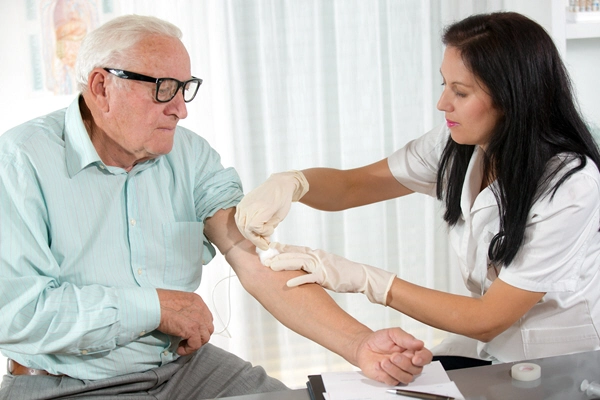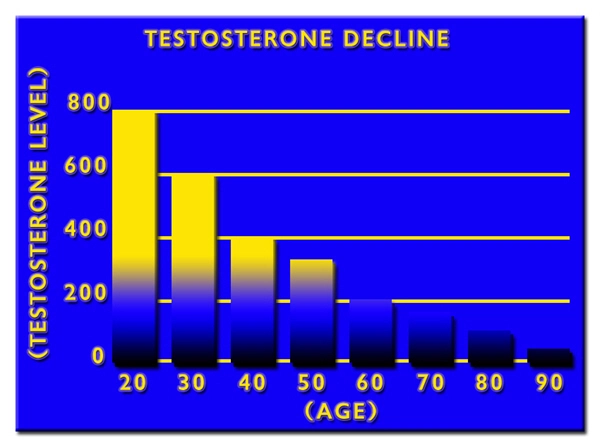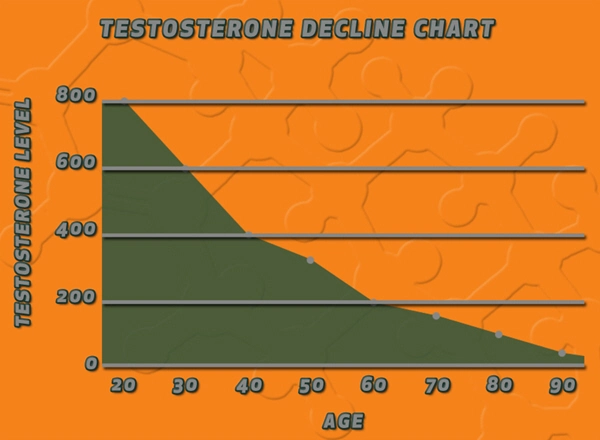Introduction
Testosterone replacement therapy (TRT) has become increasingly prevalent among American males seeking to mitigate the effects of hypogonadism and age-related testosterone decline. While TRT's benefits on libido, muscle mass, and mood are well-documented, its impact on hematological parameters, particularly erythropoiesis, warrants a closer examination. This article delves into the clinical investigation of TRT's influence on red blood cell production and related hematological markers in American men, providing crucial insights for both patients and healthcare providers.
Background on Testosterone and Erythropoiesis
Testosterone, a pivotal androgen hormone, not only governs male sexual characteristics but also plays a significant role in erythropoiesis—the process of red blood cell production. The hormone stimulates erythropoietin (EPO) production in the kidneys, which in turn promotes the proliferation and differentiation of erythroid progenitor cells in the bone marrow. Given this relationship, TRT has the potential to alter hematocrit and hemoglobin levels, which are critical indicators of blood health.
Clinical Studies on TRT and Hematological Parameters
Recent clinical studies have provided compelling evidence of TRT's impact on erythropoiesis. A longitudinal study involving American males aged 40 to 70 years on TRT showed a statistically significant increase in hematocrit levels over a 12-month period. The mean hematocrit rose from 44% to 48%, surpassing the normal range of 38.8% to 50% for adult males. Similarly, hemoglobin concentrations increased from an average of 14.5 g/dL to 15.5 g/dL, approaching the upper limit of the normal range (13.2 to 16.6 g/dL).
Risks and Considerations of Elevated Hematocrit
While an increase in hematocrit and hemoglobin can enhance oxygen-carrying capacity, excessively high levels pose significant health risks. Elevated hematocrit, a condition known as polycythemia, can lead to increased blood viscosity, which heightens the risk of thromboembolic events such as strokes and myocardial infarctions. Therefore, monitoring hematological parameters is essential for men undergoing TRT to prevent potential complications.
Management Strategies for TRT-Induced Polycythemia
To mitigate the risk of polycythemia, healthcare providers may employ several management strategies. These include adjusting the TRT dosage, implementing periodic phlebotomy to reduce red blood cell mass, and closely monitoring hematocrit levels. In some cases, temporary cessation of TRT may be necessary until hematocrit levels return to a safe range. It is crucial for patients to work closely with their healthcare providers to tailor TRT regimens that balance therapeutic benefits with hematological safety.
The Role of Lifestyle and Nutrition
Lifestyle factors and nutritional status also play a role in managing hematological parameters during TRT. Adequate hydration, a balanced diet rich in iron and other essential nutrients, and regular physical activity can support healthy erythropoiesis. Conversely, smoking and excessive alcohol consumption can exacerbate the risk of polycythemia and should be avoided.
Future Directions in TRT Research
As TRT continues to gain popularity, ongoing research is essential to refine our understanding of its hematological effects. Future studies should focus on identifying predictors of TRT-induced polycythemia, exploring the long-term cardiovascular outcomes associated with elevated hematocrit, and developing personalized TRT protocols that minimize hematological risks while maximizing therapeutic benefits.
Conclusion
The impact of testosterone replacement therapy on erythropoiesis in American males is a critical area of clinical investigation. While TRT can enhance red blood cell production, it also carries the risk of polycythemia, necessitating vigilant monitoring and management. By understanding the hematological effects of TRT, healthcare providers can better support their patients in achieving optimal health outcomes. As research progresses, the medical community will continue to refine TRT protocols to ensure safety and efficacy for American men seeking to improve their quality of life through hormone therapy.

- TRT and Mental Health: Benefits, Risks, and Holistic Approaches for American Men [Last Updated On: March 2nd, 2025] [Originally Added On: March 2nd, 2025]
- Economic Impact of Testosterone Replacement Therapy in U.S. Healthcare [Last Updated On: March 16th, 2025] [Originally Added On: March 16th, 2025]
- Navigating Testosterone Replacement Therapy: Benefits, Insurance, and Methods for American Males [Last Updated On: March 17th, 2025] [Originally Added On: March 17th, 2025]
- American Men's Journey with Testosterone Replacement Therapy: Experiences and Insights [Last Updated On: March 17th, 2025] [Originally Added On: March 17th, 2025]
- Testosterone Replacement Therapy: Benefits, Risks, and Holistic Management for Young Men [Last Updated On: March 18th, 2025] [Originally Added On: March 18th, 2025]
- Optimizing TRT for American Men: Diet, Exercise, and Holistic Health Strategies [Last Updated On: March 19th, 2025] [Originally Added On: March 19th, 2025]
- Testosterone Replacement Therapy: Enhancing Male Health and Vitality in American Men [Last Updated On: March 19th, 2025] [Originally Added On: March 19th, 2025]
- TRT: Enhancing Bone Health in American Males with Hypogonadism [Last Updated On: March 19th, 2025] [Originally Added On: March 19th, 2025]
- Testosterone Replacement Therapy: Advances, Personalization, and Future in U.S. Men's Health [Last Updated On: March 20th, 2025] [Originally Added On: March 20th, 2025]
- Enhancing TRT: Nutrition, Exercise, Stress Management, and Holistic Health for American Men [Last Updated On: March 20th, 2025] [Originally Added On: March 20th, 2025]
- TRT Benefits and Prostate Health: Navigating Risks and Monitoring Strategies [Last Updated On: March 20th, 2025] [Originally Added On: March 20th, 2025]
- TRT Enhances Sleep Quality in American Males: Benefits, Mechanisms, and Considerations [Last Updated On: March 21st, 2025] [Originally Added On: March 21st, 2025]
- Testosterone Replacement Therapy: Dosage, Administration, and Monitoring for American Males [Last Updated On: March 22nd, 2025] [Originally Added On: March 22nd, 2025]
- TRT's Impact on Cardiovascular Health in American Men: Risks and Benefits [Last Updated On: March 22nd, 2025] [Originally Added On: March 22nd, 2025]
- Testosterone Replacement Therapy: Benefits, Risks, and Latest Research for American Men [Last Updated On: March 23rd, 2025] [Originally Added On: March 23rd, 2025]
- Cultural Attitudes Toward Testosterone Replacement Therapy Among American Men [Last Updated On: March 23rd, 2025] [Originally Added On: March 23rd, 2025]
- TRT: Enhancing Cognitive Function and Mental Clarity in American Men [Last Updated On: March 23rd, 2025] [Originally Added On: March 23rd, 2025]
- TRT: A Comprehensive Approach to Weight Management in American Males [Last Updated On: March 23rd, 2025] [Originally Added On: March 23rd, 2025]
- Testosterone Replacement Therapy: Benefits, Risks, and Managing Expectations for American Men [Last Updated On: March 24th, 2025] [Originally Added On: March 24th, 2025]
- TRT's Potential to Enhance Mood in American Males: A Comprehensive Overview [Last Updated On: March 24th, 2025] [Originally Added On: March 24th, 2025]
- TRT: A Promising Solution for Joint Health in American Males [Last Updated On: March 24th, 2025] [Originally Added On: March 24th, 2025]
- Hypogonadism in American Males: Understanding TRT Benefits and Risks [Last Updated On: March 24th, 2025] [Originally Added On: March 24th, 2025]
- Managing Testosterone Therapy Side Effects: Strategies for American Males [Last Updated On: March 25th, 2025] [Originally Added On: March 25th, 2025]
- TRT: Enhancing Cognitive Function in American Men - Benefits and Considerations [Last Updated On: March 25th, 2025] [Originally Added On: March 25th, 2025]
- Testosterone Replacement Therapy: Combating Fatigue in American Men [Last Updated On: March 25th, 2025] [Originally Added On: March 25th, 2025]
- Testosterone Replacement Therapy: A Promising Approach to Managing Chronic Pain in Men [Last Updated On: March 25th, 2025] [Originally Added On: March 25th, 2025]
- TRT and Hair Loss: Understanding Risks and Management Strategies for American Men [Last Updated On: March 25th, 2025] [Originally Added On: March 25th, 2025]
- TRT's Impact on Vision: Benefits, Risks, and Research for American Males [Last Updated On: March 25th, 2025] [Originally Added On: March 25th, 2025]
- Testosterone Replacement Therapy: A Promising Approach to Combat Depression in American Males [Last Updated On: March 26th, 2025] [Originally Added On: March 26th, 2025]
- Low Libido in American Males: Understanding and Managing with TRT [Last Updated On: March 26th, 2025] [Originally Added On: March 26th, 2025]
- TRT Benefits for American Males: Enhancing Skin Health and Vitality [Last Updated On: March 26th, 2025] [Originally Added On: March 26th, 2025]
- Testosterone Replacement Therapy: Enhancing Muscle Mass in American Men [Last Updated On: March 26th, 2025] [Originally Added On: March 26th, 2025]
- TRT: Understanding Its Impact on Fertility and Alternatives for American Men [Last Updated On: March 26th, 2025] [Originally Added On: March 26th, 2025]
- TRT's Impact on Immune Function in American Men: A Comprehensive Overview [Last Updated On: March 26th, 2025] [Originally Added On: March 26th, 2025]
- Exploring Testosterone Replacement Therapy: Benefits, Risks, and Considerations for Aging Males [Last Updated On: March 26th, 2025] [Originally Added On: March 26th, 2025]
- Choosing the Right Clinic for Testosterone Replacement Therapy: A Comprehensive Guide [Last Updated On: March 26th, 2025] [Originally Added On: March 26th, 2025]
- TRT: Enhancing Respiratory Health in American Men with Hypogonadism [Last Updated On: March 27th, 2025] [Originally Added On: March 27th, 2025]
- TRT's Impact on Liver Health: Risks and Monitoring for American Men [Last Updated On: March 27th, 2025] [Originally Added On: March 27th, 2025]
- TRT Enhances Injury Recovery in American Males: Benefits and Risks [Last Updated On: March 27th, 2025] [Originally Added On: March 27th, 2025]
- Testosterone Replacement Therapy: Monitoring, Adjustments, and Lifestyle for Optimal Health [Last Updated On: March 27th, 2025] [Originally Added On: March 27th, 2025]
- TRT's Impact on Digestive Health: Benefits, Risks, and Considerations for American Men [Last Updated On: March 27th, 2025] [Originally Added On: March 27th, 2025]
- TRT and Diabetes in American Men: Benefits, Risks, and Lifestyle Integration [Last Updated On: March 27th, 2025] [Originally Added On: March 27th, 2025]
- Testosterone Replacement Therapy: Costs, Benefits, and Considerations for American Men [Last Updated On: March 27th, 2025] [Originally Added On: March 27th, 2025]
- Testosterone Replacement Therapy: Enhancing Life with Lifestyle Changes for American Males [Last Updated On: March 27th, 2025] [Originally Added On: March 27th, 2025]
- TRT: Enhancing Stamina and Vitality in American Males with Hypogonadism [Last Updated On: March 28th, 2025] [Originally Added On: March 28th, 2025]
- TRT: Enhancing Emotional Well-being in American Men with Hypogonadism [Last Updated On: March 28th, 2025] [Originally Added On: March 28th, 2025]
- Testosterone Replacement Therapy: Benefits, Risks, and Methods for American Men [Last Updated On: March 28th, 2025] [Originally Added On: March 28th, 2025]
- TRT: A Promising Solution for Stress Management in American Males [Last Updated On: March 29th, 2025] [Originally Added On: March 29th, 2025]
- TRT Side Effects: Acne, Fertility Impact, Cardiovascular Risks, and More [Last Updated On: March 30th, 2025] [Originally Added On: March 30th, 2025]
- Testosterone Replacement Therapy: Boosting Confidence and Quality of Life in American Males [Last Updated On: March 30th, 2025] [Originally Added On: March 30th, 2025]
- TRT and Blood Pressure: Monitoring and Managing Cardiovascular Health in American Men [Last Updated On: March 30th, 2025] [Originally Added On: March 30th, 2025]
- TRT's Impact on Kidney Function: Risks, Benefits, and Monitoring for American Males [Last Updated On: March 30th, 2025] [Originally Added On: March 30th, 2025]
- TRT's Impact on Cholesterol Levels in American Males: Monitoring and Management Strategies [Last Updated On: March 31st, 2025] [Originally Added On: March 31st, 2025]
- Testosterone Replacement Therapy: Benefits, Risks, and Optimization for American Males [Last Updated On: March 31st, 2025] [Originally Added On: March 31st, 2025]
- TRT's Impact on Blood Sugar: Insights for American Men [Last Updated On: April 1st, 2025] [Originally Added On: April 1st, 2025]
- TRT's Impact on Thyroid Function in American Men: A Comprehensive Analysis [Last Updated On: April 5th, 2025] [Originally Added On: April 5th, 2025]
- TRT: Enhancing Athletic Performance in American Males - Benefits and Risks [Last Updated On: April 8th, 2025] [Originally Added On: April 8th, 2025]
- Testosterone Replacement Therapy: Benefits, Allergic Risks, and Management Strategies [Last Updated On: April 8th, 2025] [Originally Added On: April 8th, 2025]
- Maximizing TRT Benefits: Integrating Therapy with Lifestyle and Medical Treatments for American Males [Last Updated On: April 9th, 2025] [Originally Added On: April 9th, 2025]
- TRT's Impact on Male Fertility: Risks, Reversibility, and Alternatives [Last Updated On: April 9th, 2025] [Originally Added On: April 9th, 2025]
- TRT's Impact on Hearing Health: Insights and Considerations for American Males [Last Updated On: April 9th, 2025] [Originally Added On: April 9th, 2025]
- Testosterone Replacement Therapy: Understanding and Interpreting Lab Results for Optimal Treatment [Last Updated On: April 10th, 2025] [Originally Added On: April 10th, 2025]
- TRT's Impact on Dental Health: Risks, Benefits, and Care Strategies for American Men [Last Updated On: April 10th, 2025] [Originally Added On: April 10th, 2025]
- TRT's Impact on Nail Health: Benefits and Challenges for American Men [Last Updated On: April 11th, 2025] [Originally Added On: April 11th, 2025]
- TRT: Enhancing Eye Health in American Men Through Hormone Therapy [Last Updated On: April 12th, 2025] [Originally Added On: April 12th, 2025]
- Traveling with TRT: A Comprehensive Guide for American Men [Last Updated On: April 12th, 2025] [Originally Added On: April 12th, 2025]
- TRT's Impact on Social Life: Boosting Confidence and Engagement in American Males [Last Updated On: April 13th, 2025] [Originally Added On: April 13th, 2025]
- Legal Aspects of Testosterone Replacement Therapy for American Males: A Comprehensive Guide [Last Updated On: April 15th, 2025] [Originally Added On: April 15th, 2025]
- TRT's Impact on Hand Health: Benefits and Risks for American Men [Last Updated On: April 15th, 2025] [Originally Added On: April 15th, 2025]
- Testosterone Replacement Therapy: Benefits and Social Implications for American Males [Last Updated On: April 16th, 2025] [Originally Added On: April 16th, 2025]
- Exploring the Psychological Impacts of Testosterone Replacement Therapy for American Men [Last Updated On: April 17th, 2025] [Originally Added On: April 17th, 2025]
- TRT: Boosting Work Performance and Vitality in American Males [Last Updated On: April 17th, 2025] [Originally Added On: April 17th, 2025]
- TRT's Impact on Artistic Expression in American Males: Creativity and Risks [Last Updated On: April 17th, 2025] [Originally Added On: April 17th, 2025]
- TRT's Impact on Neck Health: Considerations for American Men [Last Updated On: April 17th, 2025] [Originally Added On: April 17th, 2025]
- Ethical Considerations in Testosterone Replacement Therapy for American Men [Last Updated On: April 18th, 2025] [Originally Added On: April 18th, 2025]
- TRT's Impact on Chest Health: Benefits, Risks, and Management in American Men [Last Updated On: April 19th, 2025] [Originally Added On: April 19th, 2025]
- TRT Benefits for American Males: Enhancing Foot Health and Mobility [Last Updated On: April 19th, 2025] [Originally Added On: April 19th, 2025]
- TRT's Impact on Back Health in American Males: Benefits and Considerations [Last Updated On: April 20th, 2025] [Originally Added On: April 20th, 2025]
- Testosterone Replacement Therapy: Benefits, Risks, and the Need for Medical Supervision in the U.S. [Last Updated On: April 21st, 2025] [Originally Added On: April 21st, 2025]
- TRT: Enhancing Abdominal Health and Reducing Fat in American Men [Last Updated On: April 21st, 2025] [Originally Added On: April 21st, 2025]



List of USA state clinics - click a flag below for blood testing clinics.
Word Count: 576



















































